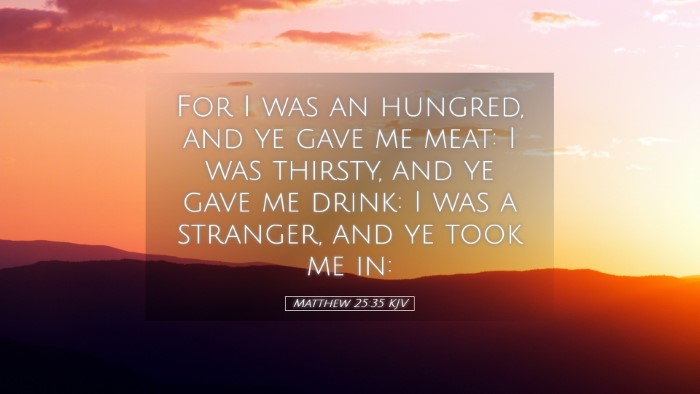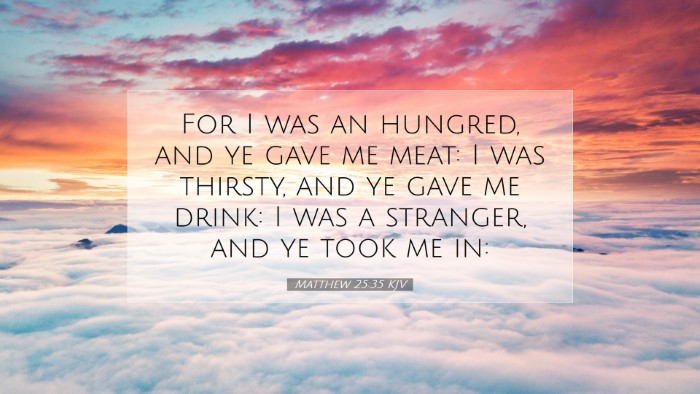Commentary on Matthew 25:35
This verse forms part of the parable of the sheep and the goats (Matthew 25:31-46), wherein Jesus articulates the criteria for judgment based on acts of mercy and compassion. It reads:
"For I was hungry and you gave me something to eat, I was thirsty and you gave me something to drink, I was a stranger and you invited me in..."
Contextual Analysis
The setting of this text occurs during the final discourse of Jesus on Mount Olivet, where He is addressing His disciples about the end times and the final judgment.
He uses vivid imagery and practical scenarios to describe how one’s actions reflect one’s faith and relationship with Him.
Theological Significance
The verse carries immense theological weight, asserting that acts of service towards others, particularly the marginalized, hold deep spiritual significance.
Matthew Henry emphasizes that this portrayal reveals the character of Christ in His people, as serving others equates to serving Him.
Acts of Compassion as Service to Christ
Albert Barnes elaborates on this concept, suggesting that the way in which believers treat the least of these is indicative of their relationship with Christ.
Each act of kindness is viewed as a direct service to Jesus Himself. He reasons that the identification of Christ with the poor and needy demonstrates the radical inclusivity of His ministry.
Practical Implications for Ministry
For pastors and church leaders, this passage serves as a clarion call to engage in social justice and outreach initiatives. Adam Clarke points out that church communities should actively embody the teachings of this verse by providing for those who lack basic necessities.
The church is to be a beacon of hope and a source of sustenance for the world, showcasing the love of Christ through tangible actions.
Exegetical Insights
Understanding this passage requires a look into the Greek context of certain terms. The verbs "gave" and "invited" imply a sense of action that is not just momentary but part of a lifestyle of generosity and hospitality.
Matthew Henry notes that these actions reflect a faith that works through love, as illustrated in Galatians 5:6. Thus, believers are called to a faith that manifests in deeds.
Understanding the "Least of These"
Jesus’ reference to "the least of these" encompasses a broader category than mere physical need; it includes emotional and spiritual destitution.
Clarke highlights that the poor, the stranger, and those lacking companionship are integral to the Kingdom of God. In ministering to them, believers live out the gospel.
- Spiritual hospitality: Inviting the stranger is not only about physical space but also includes spiritual acceptance and love.
- Physical sustenance: Providing food and drink symbolizes meeting both physical needs and nurturing relationships.
- Emotional support: Recognizing the emotional needs of individuals and being present in their struggles demonstrates God’s love in action.
Reflection for Today’s Church
The modern church must grapple with the implications of this verse amidst societal issues like poverty, immigration, and community isolation.
As noted by Barnes, the church must not merely preach the gospel but also practice it through acts of charity and support for those in need.
This dual approach ensures the faith community mirrors the love and compassion of Christ in the world.
Conclusion
Matthew 25:35 serves as a profound reminder that the heart of Christian faith lies in action.
The challenge for pastors, students, and theologians is not only to comprehend the depth of Jesus' words but also to operationalize them within their ministries and lives.
By embracing the call to serve and uplift the least of these, believers not only affirm their faith but also participate in the transformational work of Christ in a world desperately in need of His love.


